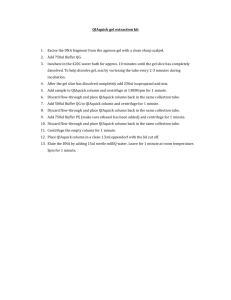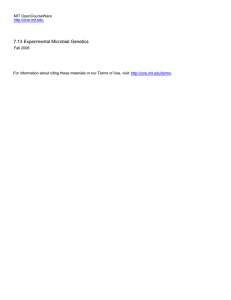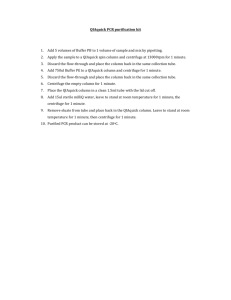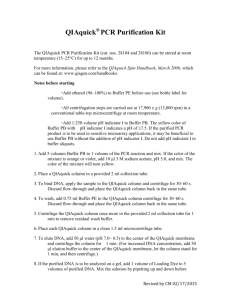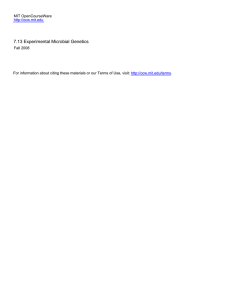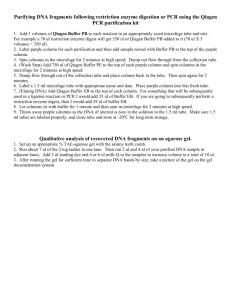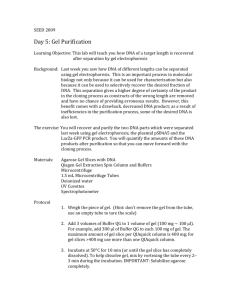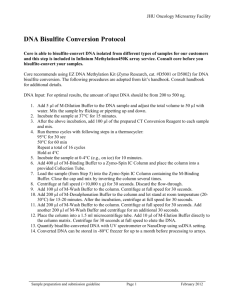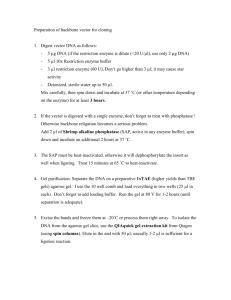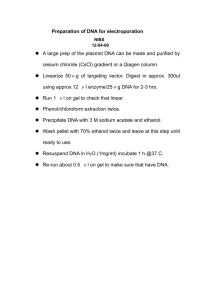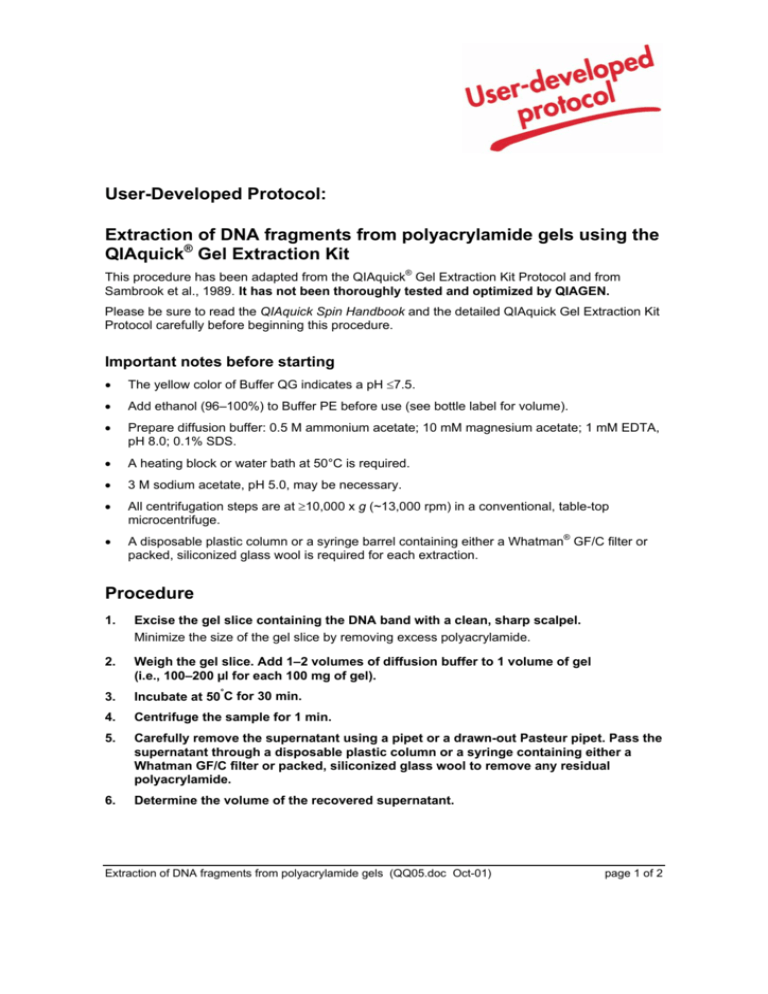
User-Developed Protocol:
Extraction of DNA fragments from polyacrylamide gels using the
QIAquick® Gel Extraction Kit
This procedure has been adapted from the QIAquick® Gel Extraction Kit Protocol and from
Sambrook et al., 1989. It has not been thoroughly tested and optimized by QIAGEN.
Please be sure to read the QIAquick Spin Handbook and the detailed QIAquick Gel Extraction Kit
Protocol carefully before beginning this procedure.
Important notes before starting
•
The yellow color of Buffer QG indicates a pH ≤7.5.
•
Add ethanol (96–100%) to Buffer PE before use (see bottle label for volume).
•
Prepare diffusion buffer: 0.5 M ammonium acetate; 10 mM magnesium acetate; 1 mM EDTA,
pH 8.0; 0.1% SDS.
•
A heating block or water bath at 50°C is required.
•
3 M sodium acetate, pH 5.0, may be necessary.
•
All centrifugation steps are at ≥10,000 x g (~13,000 rpm) in a conventional, table-top
microcentrifuge.
•
A disposable plastic column or a syringe barrel containing either a Whatman® GF/C filter or
packed, siliconized glass wool is required for each extraction.
Procedure
1.
Excise the gel slice containing the DNA band with a clean, sharp scalpel.
Minimize the size of the gel slice by removing excess polyacrylamide.
2.
Weigh the gel slice. Add 1–2 volumes of diffusion buffer to 1 volume of gel
(i.e., 100–200 µl for each 100 mg of gel).
3.
Incubate at 50°C for 30 min.
4.
Centrifuge the sample for 1 min.
5.
Carefully remove the supernatant using a pipet or a drawn-out Pasteur pipet. Pass the
supernatant through a disposable plastic column or a syringe containing either a
Whatman GF/C filter or packed, siliconized glass wool to remove any residual
polyacrylamide.
6.
Determine the volume of the recovered supernatant.
Extraction of DNA fragments from polyacrylamide gels (QQ05.doc Oct-01)
page 1 of 2
7.
Add 3 volumes of Buffer QG to 1 volume of supernatant and mix. Check that the color
of the mixture is yellow.
If the color of the mixture is orange or violet, add 10 µl 3 M sodium acetate, pH 5.0. The
color of the mixture will turn yellow.
8.
Place a QIAquick Spin Column in a provided 2 ml collection tube.
9.
To bind DNA, apply the sample to the QIAquick Spin Column and centrifuge for
30–60 s.
10. Discard flow-through and place QIAquick Spin Column back into the same collection
tube.
11. To wash, add 0.75 ml Buffer PE to column and centrifuge for 30–60 s.
12. Discard flow-through and place QIAquick Spin Column back in the same tube.
Centrifuge column for an additional 1 min at maximum speed.
IMPORTANT: Residual ethanol from Buffer PE will not be completely removed unless the
flow-through is discarded before this additional centrifugation.
13. Place QIAquick Spin Column into a clean 1.5 ml microcentrifuge tube.
14. To elute DNA, add 50 µl Buffer EB (10 mM Tris·Cl, pH 8.5) or water to the center of the
QIAquick Spin Column and centrifuge for 1 min. Alternatively, for increased DNA
concentration, add 30 µl elution buffer to the center of the column, let stand for 1 min,
and then centrifuge.
IMPORTANT: Ensure that the elution buffer is dispensed directly onto the
QIAquick membrane for complete elution of bound DNA. The average eluate volume is 48 µl
from 50 µl elution buffer volume, and 28 µl from 30 µl.
Elution efficiency is dependent on pH. The maximum elution efficiency is achieved between
pH 7.0 and 8.5. When using water, make sure that the pH value is within this range, and
store DNA at –20°C as DNA may degrade in the absence of a buffering agent. The purified
DNA can also be eluted in TE buffer (10 mM Tris·Cl, 1 mM EDTA, pH 8.0), but the EDTA
may inhibit subsequent enzymatic reactions.
Reference
Sambrook, J., Fritsch, E.F., and Maniatis, T. (1989) Molecular cloning: a laboratory manual,
2nd ed., Cold Spring Harbor Laboratory Press, Cold Spring Harbor.
QIAGEN handbooks can be requested from QIAGEN Technical Service or your local QIAGEN distributor.
Selected handbooks can be downloaded from www.qiagen.com/literature/handbooks/default.asp.
Material safety data sheets (MSDS) for any QIAGEN product can be downloaded from www.qiagen.com/ts/msds.asp.
®
®
®
Trademarks: QIAGEN , QIAquick (QIAGEN); Whatman (Whatman International Ltd.).
© 2001 QIAGEN, all rights reserved.
Extraction of DNA fragments from polyacrylamide gels (QQ05.doc Oct-01)
page 2 of 2

